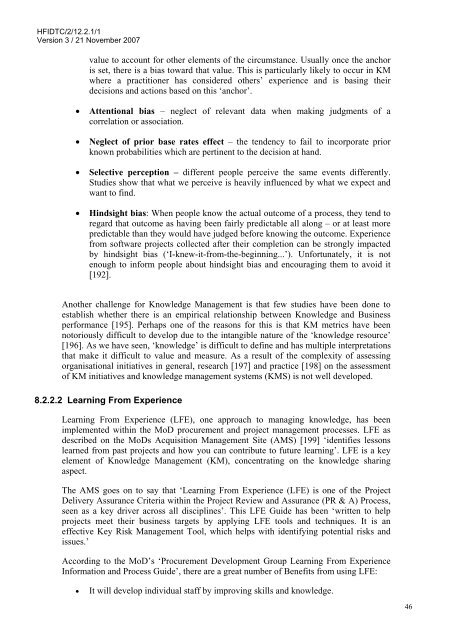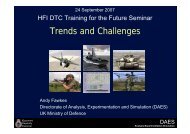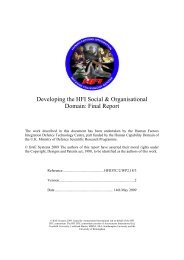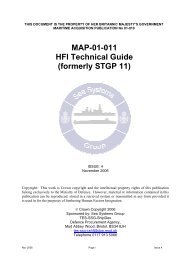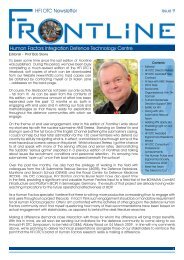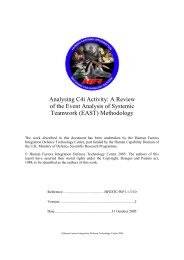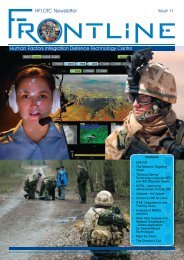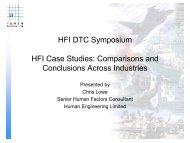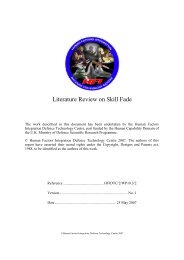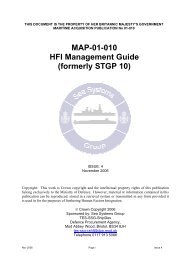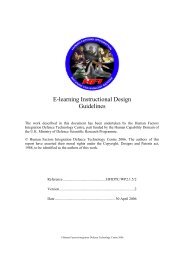The Impact of Technology Insertion on Organisations
The Impact of Technology Insertion on Organisations
The Impact of Technology Insertion on Organisations
You also want an ePaper? Increase the reach of your titles
YUMPU automatically turns print PDFs into web optimized ePapers that Google loves.
HFIDTC/2/12.2.1/1<br />
Versi<strong>on</strong> 3 / 21 November 2007<br />
value to account for other elements <str<strong>on</strong>g>of</str<strong>on</strong>g> the circumstance. Usually <strong>on</strong>ce the anchor<br />
is set, there is a bias toward that value. This is particularly likely to occur in KM<br />
where a practiti<strong>on</strong>er has c<strong>on</strong>sidered others’ experience and is basing their<br />
decisi<strong>on</strong>s and acti<strong>on</strong>s based <strong>on</strong> this ‘anchor’.<br />
• Attenti<strong>on</strong>al bias – neglect <str<strong>on</strong>g>of</str<strong>on</strong>g> relevant data when making judgments <str<strong>on</strong>g>of</str<strong>on</strong>g> a<br />
correlati<strong>on</strong> or associati<strong>on</strong>.<br />
• Neglect <str<strong>on</strong>g>of</str<strong>on</strong>g> prior base rates effect – the tendency to fail to incorporate prior<br />
known probabilities which are pertinent to the decisi<strong>on</strong> at hand.<br />
• Selective percepti<strong>on</strong> – different people perceive the same events differently.<br />
Studies show that what we perceive is heavily influenced by what we expect and<br />
want to find.<br />
• Hindsight bias: When people know the actual outcome <str<strong>on</strong>g>of</str<strong>on</strong>g> a process, they tend to<br />
regard that outcome as having been fairly predictable all al<strong>on</strong>g – or at least more<br />
predictable than they would have judged before knowing the outcome. Experience<br />
from s<str<strong>on</strong>g>of</str<strong>on</strong>g>tware projects collected after their completi<strong>on</strong> can be str<strong>on</strong>gly impacted<br />
by hindsight bias (‘I-knew-it-from-the-beginning...’). Unfortunately, it is not<br />
enough to inform people about hindsight bias and encouraging them to avoid it<br />
[192].<br />
Another challenge for Knowledge Management is that few studies have been d<strong>on</strong>e to<br />
establish whether there is an empirical relati<strong>on</strong>ship between Knowledge and Business<br />
performance [195]. Perhaps <strong>on</strong>e <str<strong>on</strong>g>of</str<strong>on</strong>g> the reas<strong>on</strong>s for this is that KM metrics have been<br />
notoriously difficult to develop due to the intangible nature <str<strong>on</strong>g>of</str<strong>on</strong>g> the ‘knowledge resource’<br />
[196]. As we have seen, ‘knowledge’ is difficult to define and has multiple interpretati<strong>on</strong>s<br />
that make it difficult to value and measure. As a result <str<strong>on</strong>g>of</str<strong>on</strong>g> the complexity <str<strong>on</strong>g>of</str<strong>on</strong>g> assessing<br />
organisati<strong>on</strong>al initiatives in general, research [197] and practice [198] <strong>on</strong> the assessment<br />
<str<strong>on</strong>g>of</str<strong>on</strong>g> KM initiatives and knowledge management systems (KMS) is not well developed.<br />
8.2.2.2 Learning From Experience<br />
Learning From Experience (LFE), <strong>on</strong>e approach to managing knowledge, has been<br />
implemented within the MoD procurement and project management processes. LFE as<br />
described <strong>on</strong> the MoDs Acquisiti<strong>on</strong> Management Site (AMS) [199] ‘identifies less<strong>on</strong>s<br />
learned from past projects and how you can c<strong>on</strong>tribute to future learning’. LFE is a key<br />
element <str<strong>on</strong>g>of</str<strong>on</strong>g> Knowledge Management (KM), c<strong>on</strong>centrating <strong>on</strong> the knowledge sharing<br />
aspect.<br />
<str<strong>on</strong>g>The</str<strong>on</strong>g> AMS goes <strong>on</strong> to say that ‘Learning From Experience (LFE) is <strong>on</strong>e <str<strong>on</strong>g>of</str<strong>on</strong>g> the Project<br />
Delivery Assurance Criteria within the Project Review and Assurance (PR & A) Process,<br />
seen as a key driver across all disciplines’. This LFE Guide has been ‘written to help<br />
projects meet their business targets by applying LFE tools and techniques. It is an<br />
effective Key Risk Management Tool, which helps with identifying potential risks and<br />
issues.’<br />
According to the MoD’s ‘Procurement Development Group Learning From Experience<br />
Informati<strong>on</strong> and Process Guide’, there are a great number <str<strong>on</strong>g>of</str<strong>on</strong>g> Benefits from using LFE:<br />
• It will develop individual staff by improving skills and knowledge.<br />
46


